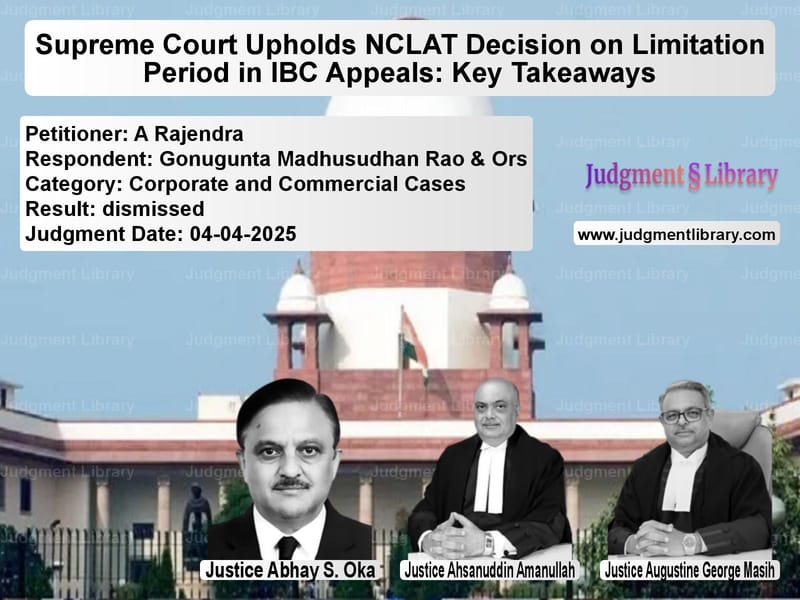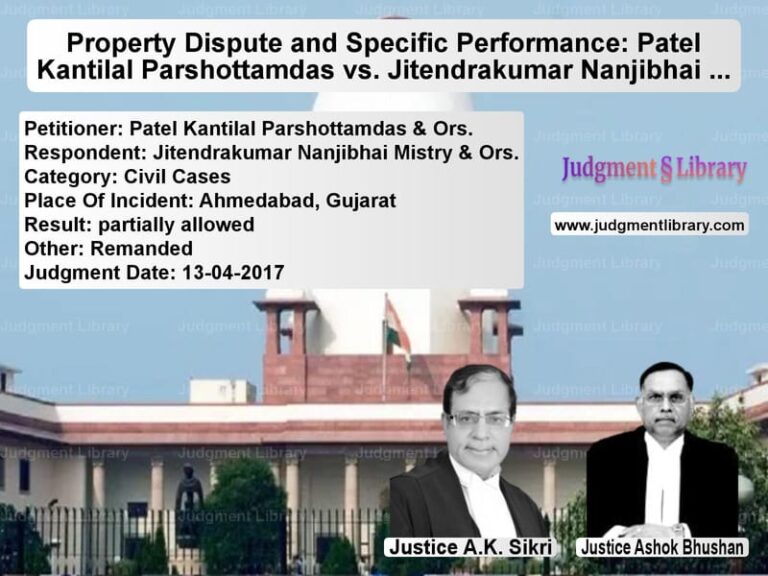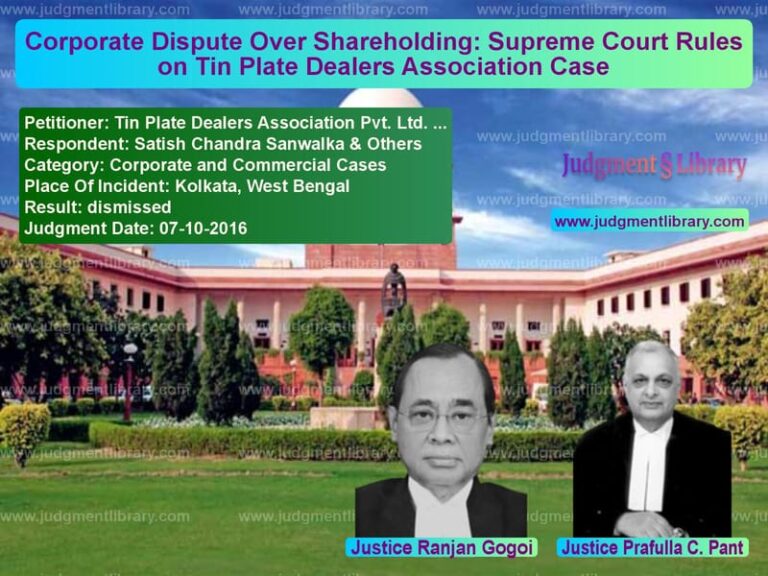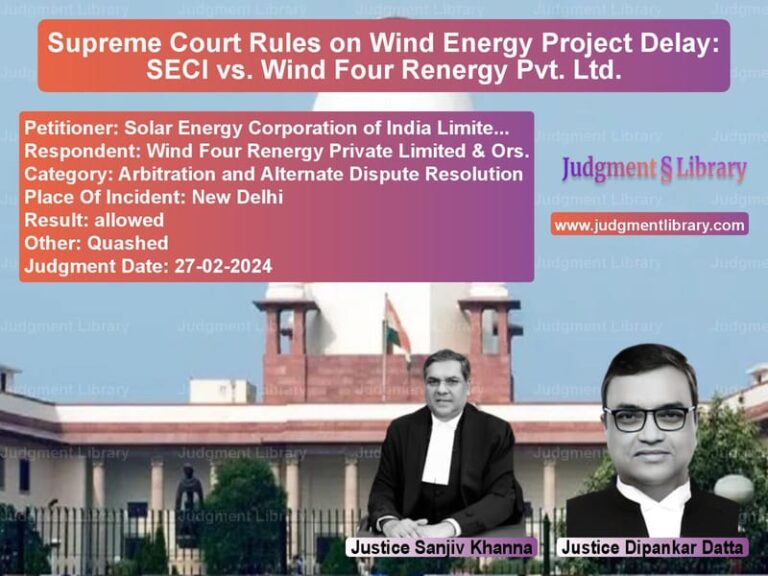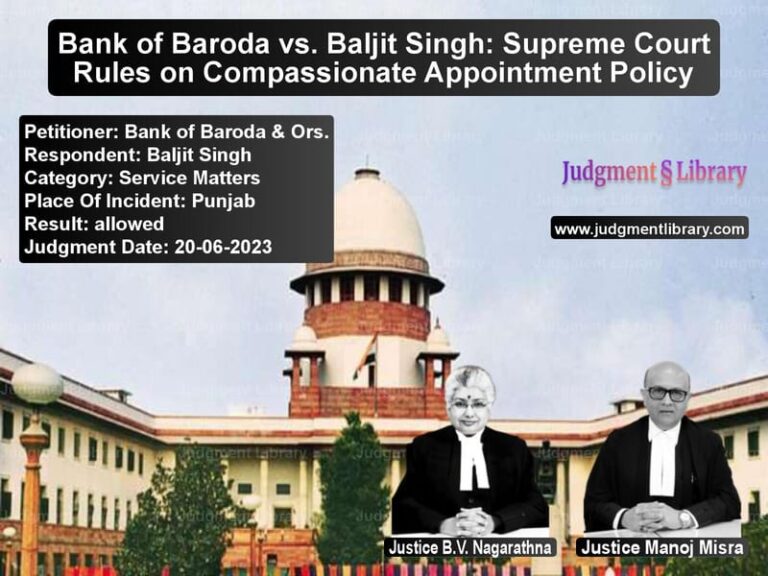Supreme Court Upholds NCLAT Decision on Limitation Period in IBC Appeals: Key Takeaways
In a significant ruling on April 4, 2025, the Supreme Court of India dismissed appeals filed by A Rajendra against orders of the National Company Law Appellate Tribunal (NCLAT) which had rejected his appeals as time-barred under the Insolvency and Bankruptcy Code (IBC), 2016. The judgment reinforces strict adherence to statutory timelines in insolvency proceedings and clarifies critical aspects of limitation periods under Section 61 of IBC.
Background of the Case
The appellant, A Rajendra, was the suspended Managing Director of Dharti Dredging and Infrastructure Limited (Corporate Debtor). He had filed two applications before the National Company Law Tribunal (NCLT):
- Seeking direction to place his Resolution Plan before the Committee of Creditors (CoC)
- Challenging approval of another Resolution Plan
Both applications were dismissed by NCLT on July 20, 2023. Rajendra filed appeals before NCLAT on August 28, 2023 – beyond the 30-day limitation period prescribed under Section 61(2) of IBC. The NCLAT dismissed the appeals as time-barred, noting that:
- No certified copies of NCLT orders were applied for
- Contradictory statements were made in appeal grounds
- No sufficient cause shown for delay
Arguments of the Appellant
Senior Counsel for Rajendra argued:
“The appeals as have been filed being within the permissible period where the delay could be condoned by the NCLAT as provided for under Section 12(3) of the Limitation Act… since 45 days had not passed on the date of filing the appeal from the date of pronouncement of the Order i.e. 20th of July, 2023 by the NCLAT, the delay in filing the appeal should have been condoned.”
Key contentions included:
- Limitation should run from date of knowledge of order contents (August 1/7, 2023)
- Delay of only 10 days (filing on August 28 vs deadline of August 19)
- Non-filing of delay condonation application initially is a curable defect
- Reliance on Sesh Nath Singh case that delay condonation application not mandatory
Arguments of the Respondents
Respondents’ counsel supported NCLAT’s order, highlighting:
“The appellant had not come to the Court with clean hands and is guilty of suppressing facts… assertion has been made that the appellant had applied for the certified copy of the Order on 01.08.2023 and received the same on 10.08.2023… whereas, as a matter of fact, it is admitted in both cases that certified copy was never applied for.”
Key rebuttals:
- Appeals filed on August 28, 2023 vs July 20, 2023 order date
- No certified copy applications made as required under NCLAT Rules
- Contradictory stands taken in appeal grounds vs delay condonation applications
- Delay condonation applications filed on December 6, 2023 – itself delayed
Supreme Court’s Analysis
The 3-judge bench comprising Justices Abhay S. Oka, Ahsanuddin Amanullah and Augustine George Masih analyzed:
1. Section 61 IBC Time Limits
“The restrictions with regard to allowing extension in the provisions stipulated is cloaked in such a manner that the provisions have to be strictly followed. The first aspect is that the period is extendable by 15 days and not beyond that.”
Key observations:
- 30-day limitation period under Section 61(2) is strict
- Maximum 15-day extension possible if sufficient cause shown
- No further extension permissible
2. Certified Copy Requirement
Citing V Nagarajan vs SKS Ispat (2021), the Court held:
“The scheme of Section 61 of the IBC, 2016 does not contain the condition for commencement of period of limitation only after obtaining a certified copy of the Order… The limitation thus, starts from the date of pronouncement of the Order and not from the date the Order is made available to the parties.”
3. Appellant’s Conduct
The Court noted serious lapses:
- No certified copy applications filed despite Rule 22 NCLAT Rules requirement
- Contradictory statements about copy applications
- No sufficient cause shown for delay
Key Precedents Cited
- V Nagarajan vs SKS Ispat (2021): Limitation under IBC runs from order pronouncement date, not certified copy receipt date.
- Cethar Limited vs SKS Ispat (2002): No delay condonation if no effort made to obtain certified copy.
- National Spot Exchange vs Anil Kohli (2022): Maximum 15-day extension possible under Section 61(2) proviso.
- Sanjay Kalate vs Vistra ITCL (2024): Limitation triggers from order pronouncement/upload date.
Court’s Decision
The Supreme Court upheld NCLAT’s order, observing:
“The facts are not in dispute… first appeal was preferred along with the free certified copy… It is an admitted position on facts that in the second appeal, no certified copy was appended… The appellant having failed to apply for certified copy renders appeal filed before the NCLAT as clearly barred by limitation.”
Key findings:
- Limitation began from July 21, 2023 (next day of July 20 order)
- Appeals filed on August 28, 2023 were beyond 30+15 day limit
- No certified copy applications made as required
- No sufficient cause shown for delay
Implications of the Judgment
This judgment has several important implications:
- Strict Adherence to Timelines: Reinforces mandatory nature of IBC’s time-bound framework
- Certified Copy Requirement: Parties must apply for certified copies promptly
- Clean Hands Doctrine: Courts will strictly view contradictory statements/conduct
- Limited Discretion: NCLAT’s power to condone delay strictly capped at 15 days
The ruling serves as a cautionary note for litigants in insolvency matters to strictly comply with procedural requirements and limitation periods under IBC.
Petitioner Name: A Rajendra.Respondent Name: Gonugunta Madhusudhan Rao & Ors.Judgment By: Justice Abhay S. Oka, Justice Ahsanuddin Amanullah, Justice Augustine George Masih.Judgment Date: 04-04-2025.Result: dismissed.
Don’t miss out on the full details! Download the complete judgment in PDF format below and gain valuable insights instantly!
Download Judgment: a-rajendra-vs-gonugunta-madhusudha-supreme-court-of-india-judgment-dated-04-04-2025.pdf
Directly Download Judgment: Directly download this Judgment
See all petitions in Bankruptcy and Insolvency
See all petitions in Company Law
See all petitions in Corporate Governance
See all petitions in Shareholder Disputes
See all petitions in Judgment by Abhay S. Oka
See all petitions in Judgment by Ahsanuddin Amanullah
See all petitions in Judgment by Augustine George Masih
See all petitions in dismissed
See all petitions in supreme court of India judgments April 2025
See all petitions in 2025 judgments
See all posts in Corporate and Commercial Cases Category
See all allowed petitions in Corporate and Commercial Cases Category
See all Dismissed petitions in Corporate and Commercial Cases Category
See all partially allowed petitions in Corporate and Commercial Cases Category

